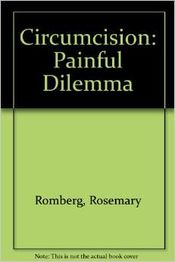Circumcision: The Painful Dilemma
| Title | Circumcision |
| Subtitle | The Painful Dilemma |
| Author | Rosemary Romberg |
| Pages | 454 |
| Format | 8.8 x 5.7 x 1.4 inches |
| First Edition | 1985 |
| Publisher | Bergin & Garvey Publishers |
| ISBN | 978-0897890748 |
Circumcision: The Painful Dilemma is a book by Rosemary Romberg, published in 1985. Its printed version seems to be sold out[1], but you may find it at some Books antiquarians.
Romberg herself has released the book content on a WordPress website for free access.[2]
Contents
Dedication
| “ | This book is dedicated to: All of the baby boys who have yet to be born into this world ... with the sincere hope that the beginnings of your lives may be peaceful and joyous, and that you may live in this world whole and complete as you were intended to be. – Rosemary Romberg (Online version of the book) |
From the "Author's own story"
I did not start my research being anti-circumcision. I was even undecided over whether or not I would choose circumcision again should I ever have another son. I fully intended to write a book that was neutral on the subject. I had planned that this book would present the pros and cons of both choices, guiding parents to either direction as best suits their lifestyles.
I began this research with the American middle class belief that male circumcision surely conferred many benefits. Therefore I did not skew the results of my research nor the personal accounts herein to conform to a pre-conceived anti-circumcision bias. Instead, it has been the personal accounts and facts that have educated me.
The personal accounts in this book tell many stories. Some are from parents of circumcised sons, all expressing remorse over their decision. Some are from parents of intact sons, all expressing peace and satisfaction with their choice. I have not received any letters from parents of circumcised sons who were happy about their decision, nor any letters from parents of intact sons who were unhappy about it.
These personal accounts, along with the facts I have uncovered, have led me to a strong stand against routine infant circumcision. If the facts supported cutting off the foreskins of infant males as a beneficial, justifiable operation, I would have presented that in this book. Instead, I have learned that none of the medical arguments for circumcision are justified, and while I believe that people’s religious beliefs require a certain degree of careful consideration and sensitivity, have found that the other so-called “social” reasons have little solid basis.
